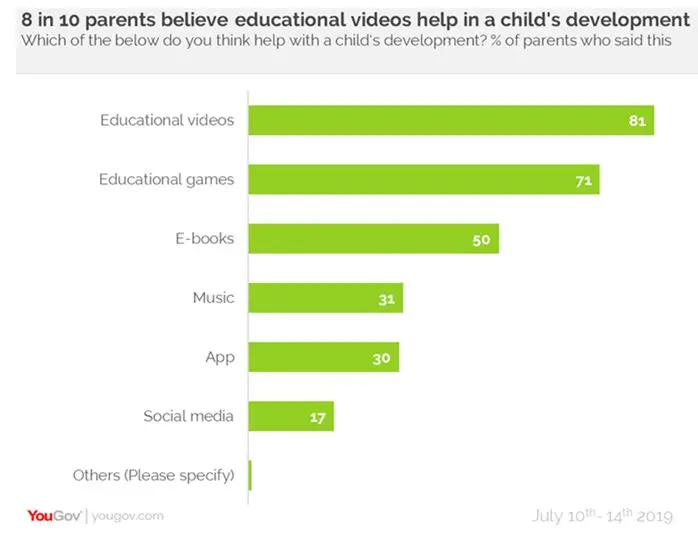Four in five (80%) parents in the UAE believe technology is a good medium for their child’s development, new YouGov research reveals. The research shows that parents who are more than 40 years in age are more likely to say this as compared to parents who are under 40 (88% vs 76%).
Most parents in the UAE believe educational videos help in their child’s development (81%). This trend is followed by educational games (71%) and E-books (50%). Around a third believe music (31%) helps in achieving the same goal. When looking into different ages of parents we noticed that parents over the age of 40 were more likely than those under 40 to consider E-books (60% vs 44%) and social media (22% vs 14%) as useful sources for children’s development.


Looking into overall usage of technology we found more than 9 in 10 (92%) parents claim to allow their child to interact with technology, with mobile phones coming out as the device with the highest use (80%), followed by I-pad (62%) and laptop (57%).
The research shows that parents over the age of 40 are more liberal in their child’s interactions with technology as compared to those in a lower age bracket. Not only are they more likely than those under 40 to let their child indulge with mobile phones (85% vs 77%), they are also more likely to let them do so more frequently- on a daily basis (61% vs 50%). The same is true for laptops, where 71% of 40 years+ parents allow their children to use a laptop, with 48% permitting this on a daily basis, as opposed to those of younger years where the figures are 48% and 25%, respectively.
When it comes to time spent with technology, close to half (47%) of parents in the UAE allow their child to spend around 1-2 hours on an average sitting. This time allowance becomes much broader when we look at parents over the age of 40, with more than two in five (42%) of them saying their child spends around 3-6 hours with technology on average.
The generational differences with parents is evident even when looking at the age when they first allowed their child to start using technology. Whilst parents aged 40 years + allowed their children to interact with technology after they completed the age of ten (24%), the younger parents introduced their children to technology much earlier, with 21% claiming they permitted usage from the age of three.
Apart from education and entertainment, technology is also used by parents to distract children in certain situations. 43% of parents find technology to be a successful distraction for their children when they are travelling. Other popular times when technology becomes a means of distraction seems to be around meal time, with a third of parents under 40 using this diversion when they are cooking (32%) or when they are feeding their child (31%).
Data collected online by YouGov Omnibus among 514 respondents in the UAE between 10th and 14th July 2019 using YouGov’s panel of over 6 million people worldwide. Data is representative of the adult online population in the country
© Press Release 2019Disclaimer: The contents of this press release was provided from an external third party provider. This website is not responsible for, and does not control, such external content. This content is provided on an “as is” and “as available” basis and has not been edited in any way. Neither this website nor our affiliates guarantee the accuracy of or endorse the views or opinions expressed in this press release.
The press release is provided for informational purposes only. The content does not provide tax, legal or investment advice or opinion regarding the suitability, value or profitability of any particular security, portfolio or investment strategy. Neither this website nor our affiliates shall be liable for any errors or inaccuracies in the content, or for any actions taken by you in reliance thereon. You expressly agree that your use of the information within this article is at your sole risk.
To the fullest extent permitted by applicable law, this website, its parent company, its subsidiaries, its affiliates and the respective shareholders, directors, officers, employees, agents, advertisers, content providers and licensors will not be liable (jointly or severally) to you for any direct, indirect, consequential, special, incidental, punitive or exemplary damages, including without limitation, lost profits, lost savings and lost revenues, whether in negligence, tort, contract or any other theory of liability, even if the parties have been advised of the possibility or could have foreseen any such damages.



















